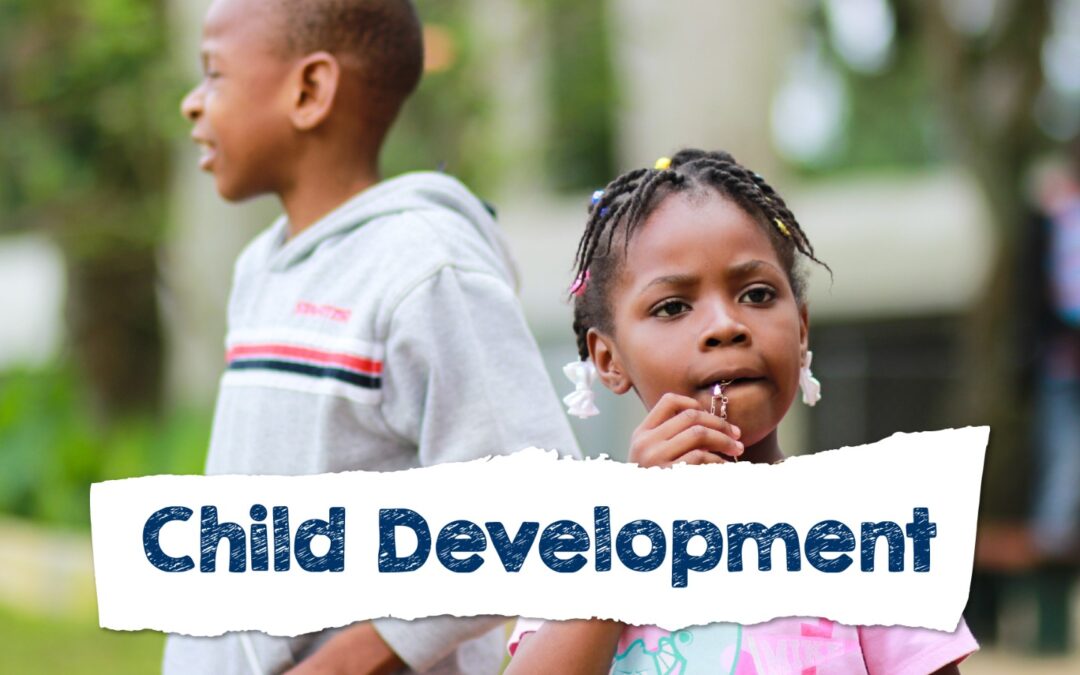CHILD DEVELOPMENT
Child development refers to how a child grows and changes over time. This is a
complex process that begins not just at birth but in the womb and continues until
adulthood. Child development is influenced by biology i.e. genetics, and the
environment, and it can be either positive or negative.
Child Development is important because the mental health of a person depends
greatly on his development as a child. Hence, It is crucial to pay attention to a
child’s development to ensure that it is adequate. This is primarily the
responsibility of parents and primary doctors via parental observations, routine
visits, and screening tools. It is important that once a lapse or delay is identified in
a child's development, the correct services should be arranged to optimize the
well-being of the child, and thus, the well-being of the future adult.
Areas Of Child Development
Child growth and development can be divided into four, namely:
1. Cognitive Development: This domain deals with how children learn new things
and solve problems. It includes how children explore their environment to figure
things out – whether by looking at the world around them, putting objects in their
mouths, or dropping something to watch it fall. This domain also includes
“academic” skills like counting and learning letters and numbers.
2. Language Development: This refers to the communication and understanding
abilities of the child.
3. Social-emotional Development: This affects how children interact with others
and process their feelings.
4. Physical Development: This refers to the development of strength and physical
skills of the child.
Developmental Milestones
Developmental Milestones are behaviors that mark stages of typical growth in
children. Children develop at their own pace, however, most pass through specific
changes at almost the same time as they get older. This milestone deals with how
children use their bodies. It includes many milestones parents excitedly wait for.
At 2 months, a child is expected to lift his head/chest when prone, have his eyes
track past the midline, be alert to sound, develop a social (reciprocal) smile, and
recognize his parent.
At 6 Months, he should know familiar people, laugh, take turns making sounds
with you, reach to grab a toy he wants and lean on his hands to support himself
when sitting.
At 9 Months, he may be shy, clingy, or fearful around strangers, make different
sounds like “mama mama” and “baba baba”, smile or laugh when you play peek-
a-boo, get to a sitting position by himself.
At 12 Months, he should be able to play games with you, call a parent “mama” or
“dada” or another special name, put something in a container, and pull up to
stand.
At 18 Months, he may move away from you, but looks to make sure you are close
by, tries to say three or more words besides “mama” or “dada”, copies you doing
chores like sweeping with a broom, walks without holding on to anyone or
anything; and may try to use a spoon.
At 2 Years, he looks at your face to see how to react in a new situation, says at
least two words together like “More milk”, and plays with more than one toy at
the same time like putting toy food on a toy plate, runs and eats with a spoon.
At 3 Years, he notices other children and joins them to play, talks with you in a
conversation using at least two back-and-forth exchanges draws a circle when you
show him how, and puts on some clothes by himself like loose pants or a jacket.
Stages Of Child Development
Child development is divided into five stages:
1. Baby/Infant Development Stage(Between Birth to 18 months): During this
period, children learn to identify familiar people, use basic utensils, or respond to
facial expressions. They may also learn a few words, and stand and walk on their
own. This is a time for developing bonds with your child that will last a lifetime,
providing them with the inner resources to build self-esteem and relate positively
to others.
2. Toddler Stage (Between 18 months to 3 years): Children may start playing
pretend games, playing with other children, or following two-part directions.
Children may begin to say the names of familiar people, especially their parents at
this stage.
3. Preschoolers Stage (Between 3 to 5 years): At this stage, children start naming
their likes and dislikes, learn to count to 10, and identify colors. They may recite
nursery rhymes, know their names and address, and play on a playground on their
own.
4. School Age Children (Between 5 to 12 years): In grade school, children grow
their problem-solving skills and confidence. They may build close friendships,
develop personal interests, and increase their reading skills.
5. Teenagers (Between 12 to 18 years): Adolescents gain increasing levels of
independence. They generally develop their own opinions, go through puberty
and become interested in dating and sexuality.
Developmental Delays In Children
Developmental delays refer to areas where children have not gained the skills
that are expected of children of their age. You may notice delays in any
developmental areas, including:
- Cognitive skills, such as problem-solving.
- Communication skills.
- Fine motor skills.
- Social skills.
- Speech and language.
Signs Of Developmental Delays
According to research, signs of developmental delays can vary significantly from
one child to another and at different stages of development. You may notice signs
of a delay during infancy and sometimes, symptoms may not show up until a child
is of school age.
Some of the most common signs of developmental delays may include:
- Rolling over, crawling, or walking much later than expected.
- Difficulty communicating, talking, or fitting in socially.
- Problems with connecting actions to consequences.
- Inability to perform everyday tasks without help, such as getting dressed or
using the bathroom. - Trouble remembering instructions.
- Learning challenges in school.
If you notice signs of developmental delays, speak with your child’s pediatrician.
The pediatrician may recommend a developmental evaluation involving any of
these specialists:
- Child psychologist.
- Developmental pediatrician (a doctor who specializes in child
development) - Neurologist.
- Occupational therapist.
- Speech-language pathologist.
- Physical therapist.
An evaluation may include observed playtime, structured tests, and parent
questionnaires. The results can determine if your child could benefit from special
interventions or therapies.
References
https://my.clevelandclinic.org/health/articles/21559-child-development
https://www.cdc.gov/ncbddd/watchmetraining/module2.html

